Washington State is home to some of North America’s greatest waterfowl hunting. Often, hunters travel from all over the world to catch various migratory birds. So, why is duck hunting season in Washington State so popular?
Washington State has such a reputation that it plays an important role in migratory patterns. The state is home to a migratory bird pathway named the Pacific Flyway. It’s one of the four major migration routes in North America.
Due to this, it’s a popular location for waterfowl or other migratory birds. If you’re interested in learning all about duck hunting season in Washington State, don’t worry. Below, we’ll give you a detailed breakdown of everything you’d need to know to enjoy the duck hunting season!
Can You Duck Hunt in Washington State?
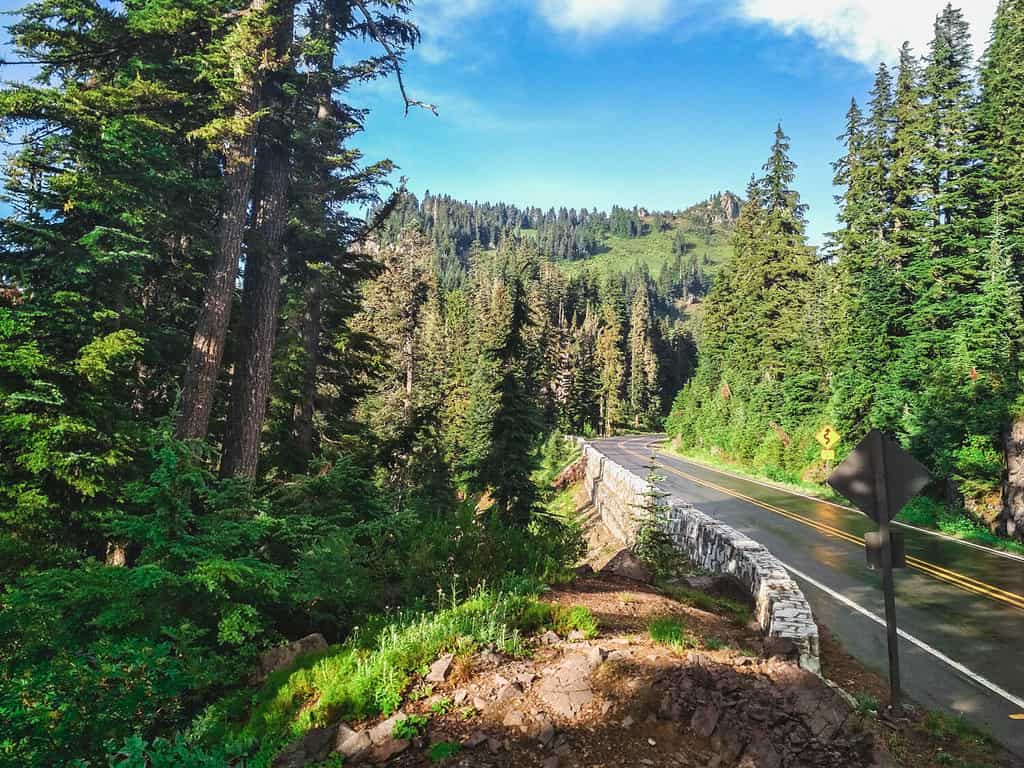
Washington State has many species of ducks that hunters can catch.
©Velimir Zeland/Shutterstock.com
You can duck hunt in Washington State during specific times of the year. It’s one of the most popular places for waterfowl hunting, as the migratory paths have plenty of birds passing through. The state has strict regulations on what types of ducks you can hunt and the amount per day.
Who Regulates Duck Hunting in Washington State?
The regulating body of duck hunting is The Washington Department of Fish and Wildlife. Its focus is actively providing a safe waterfowl hunting area alongside conservation efforts. There are strict guidelines on where and when you can hunt.
What Kind of Ducks Are in Washington State?
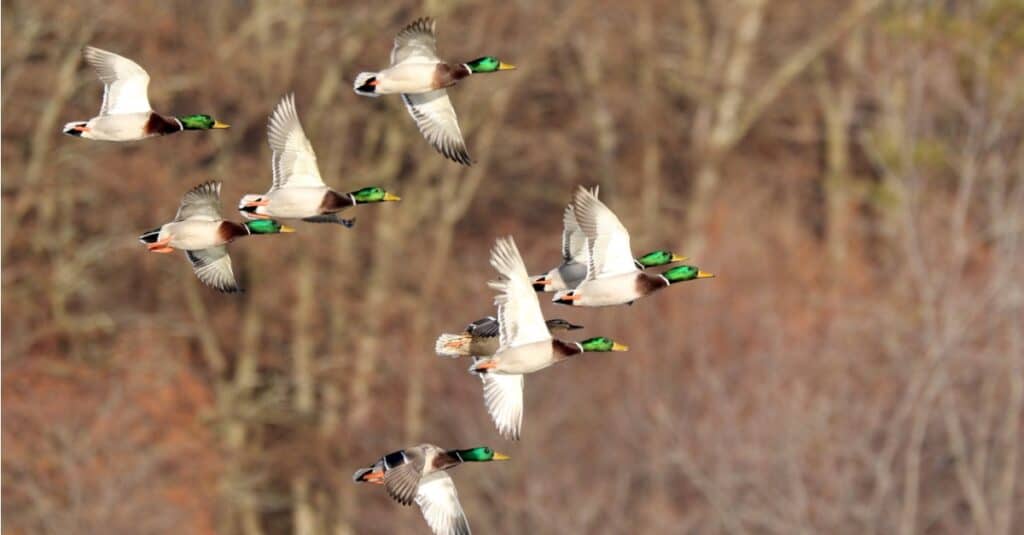
There are over 29 different species of ducks in Washington State.
©iStock.com/photosbyjimn
Since Washington State is a huge pathway for migratory birds, it attracts many duck species. In total, the state hosts 29 different species during the fall and winter seasons. Despite other states’ similar environments, Washington State attracts the ducks as a major migratory location. So, here are the 29 species you can find during duck hunting season in Washington State.
Dabbling Ducks
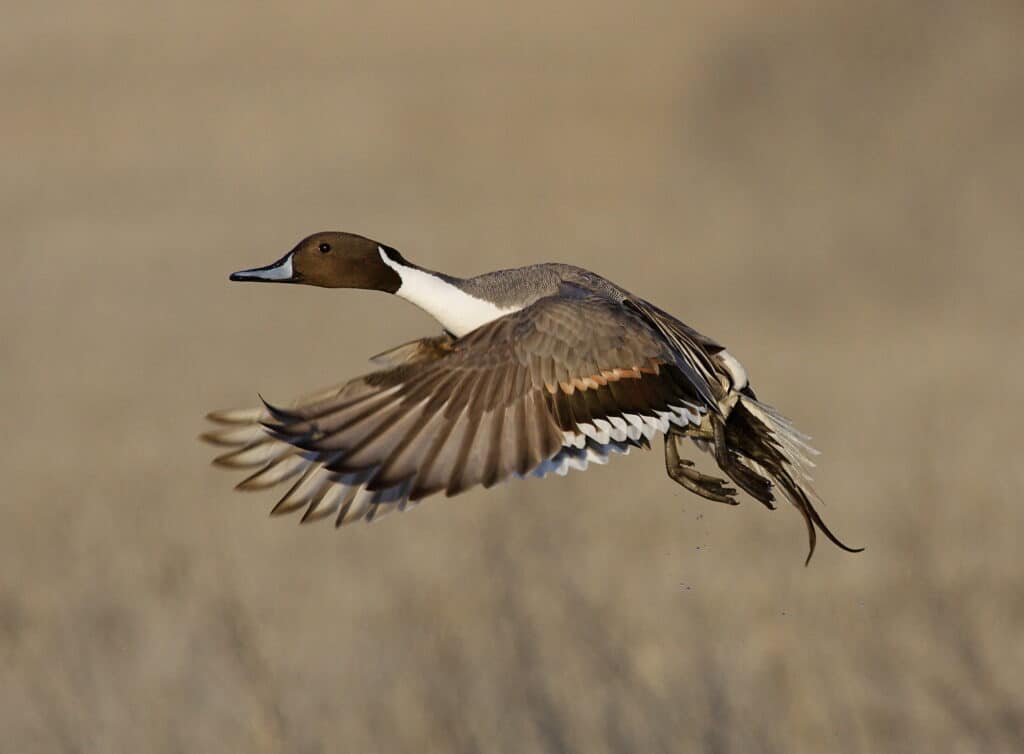
The Dabbling ducks are the most commonly found and hunted ducks in Washington State.
©Tom Reichner/Shutterstock.com
Dabbling ducks inhabit freshwater and feed off the water’s surface instead of diving. Other duck species tend to dive, but dabbling ducks will tilt their head down in the water and swoop their heads to catch food. This can look similar to nibbling just under the surface of the water.
Here are the types of Dabbling ducks you can find in Washington State:
- Mallard
- American Wigeon
- Gadwall
- Green-Winged Teal
- Northern Shoveler
- Northern Pintail
- Wood Duck
- Cinnamon Teal
- Eurasian Wigeon
- Blue-winged Teal
- American Black Duck
Diving Ducks
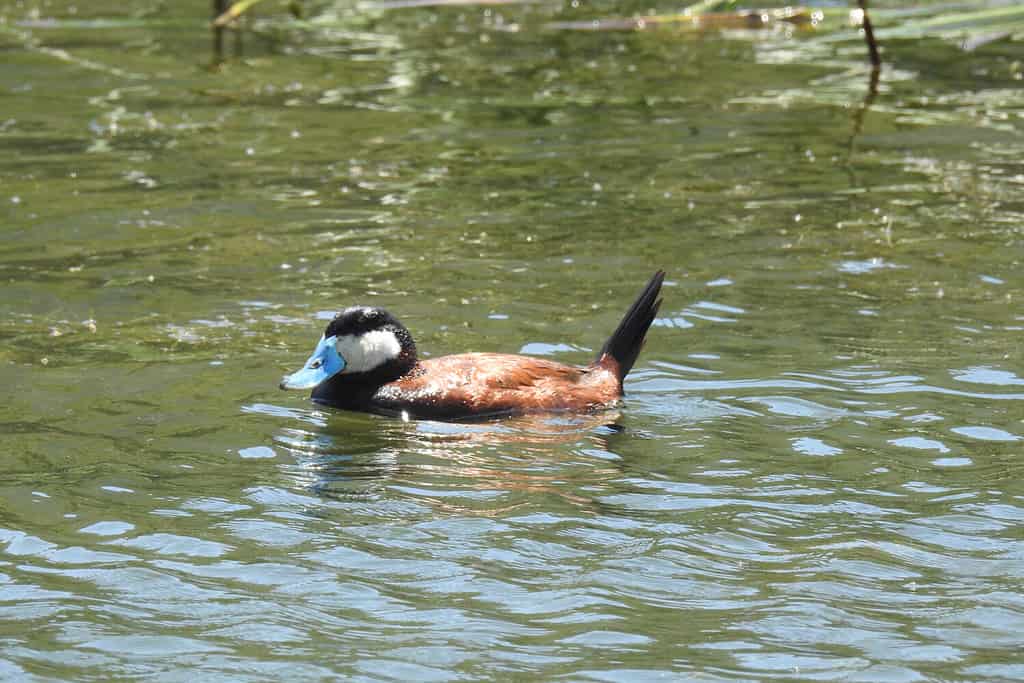
While less common, diving ducks can also be found in most of the state’s waterways.
©Scenic Corner/Shutterstock.com
Diving ducks are the opposite of dabbling, as they dive instead of staying on the water’s surface to feed. A diving duck will dive deep into the water, hoping to find food sources. This can include fish, plants, and even shellfish. Diving ducks can be found in freshwater environments, tidal lagoons, and estuaries.
- Bufflehead
- Ring-Necked Duck
- Lesser Scaup
- Greater Scaup
- Ruddy Duck
- Redhead
- Canvasback
- Tufted Duck
Sea Ducks
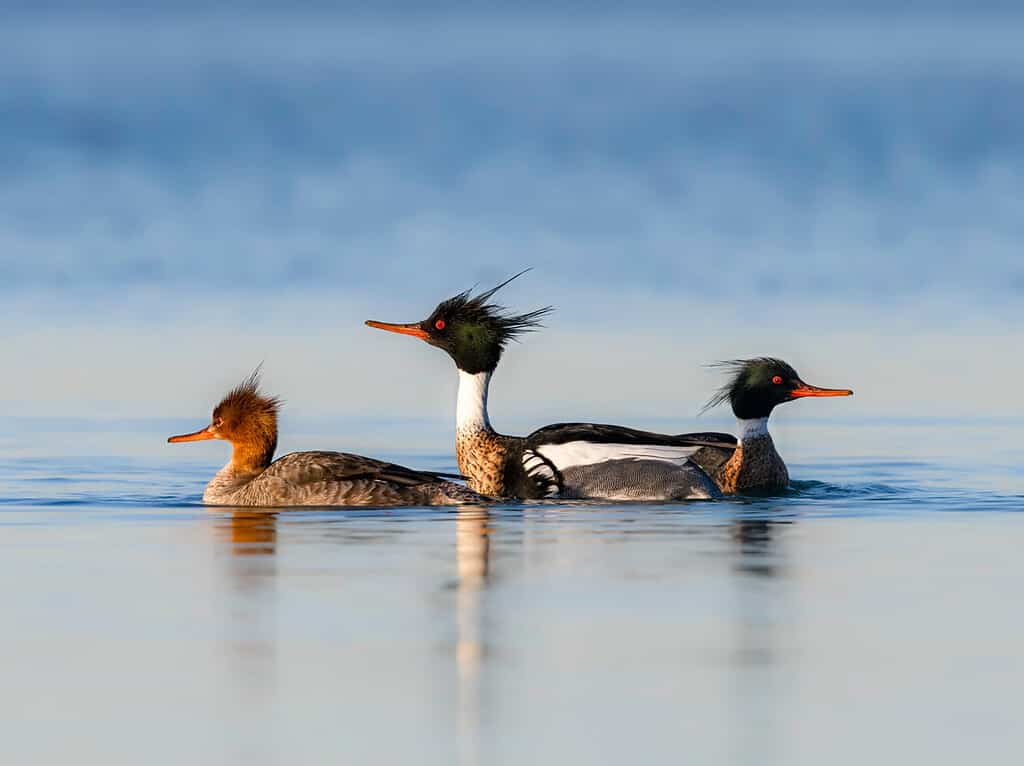
Red-breasted Mergansers can be found in many hunting areas around Washington State, mainly coastlines.
©FotoRequest/Shutterstock.com
Sea ducks are what they sound like, a species of ducks that do well in saltwater environments. Many confuse them for diving ducks, but they are part of the subfamily Mergini. These ducks are commonly seen during winter and migrate to reproduce in the northern climates.
- Common Goldeneye
- Common Merganser
- Surf Scoter
- Hooded Merganser
- Red-breasted Merganser
- Harlequin Duck
- Barrow’s Goldeneye
- White-Winged Scoter
- Long-Tailed Duck
- Black Scoter
Washington State Duck Hunting Locations
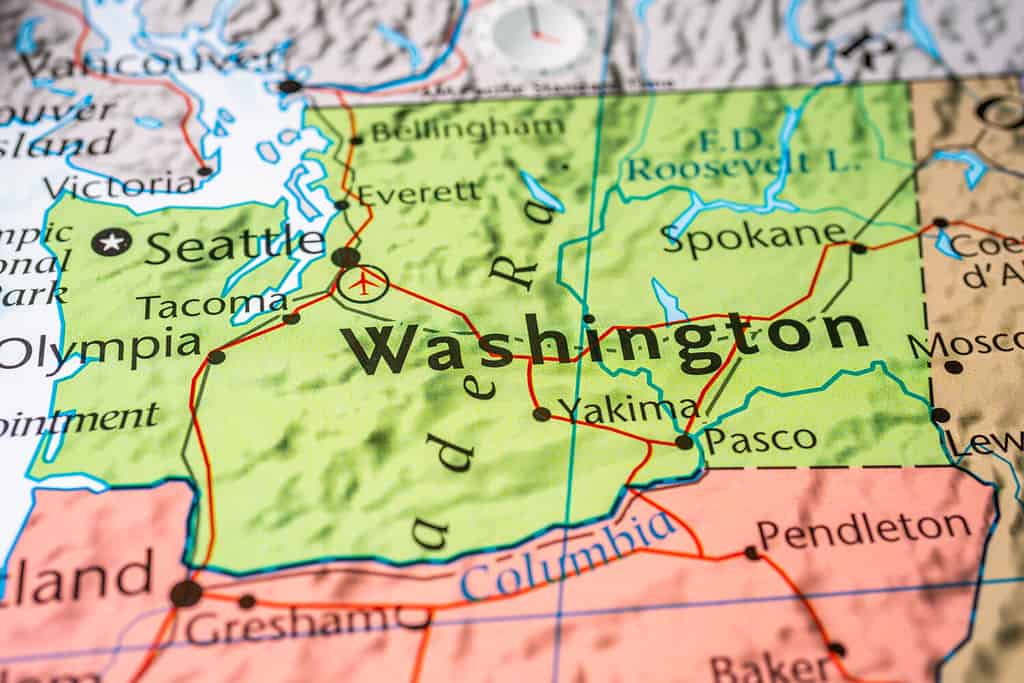
Washington State is one of the best places where you can duck hunt.
©Alexander Lukatskiy/Shutterstock.com
Similarly to other hunting regulations, hunters must hunt on private or public lands with the required permits. The Washington Department of Fish & Wildlife has an approved list of public places where hunters can go to capture ducks and other waterfowl. For private hunting, the WDFW has signed agreements with private landowners to hunt on their property. To find private land, hunters must check the county tax assessor’s office and get permission.
When Does Duck Hunting Season Start in Washington State?
The official duck hunting season in Washington State starts on October 14th and lasts until October 22nd. The second part of the season begins October 25th until January 28th. Two gaps exist between seasons, without hunting, from October 15 until October 24th. In addition, the Scaup season is located from October 14th until November 3rd.
Washington State also has youth hunting, which allows children to accompany their parents on a hunt. For western Washington, youth can hunt on September 23rd. In eastern Washington, youth can hunt on September 30th. A special day is available for youth, veterans, and active military on February 3rd.
Other Season Dates
| Area/Age | Season Dates |
|---|---|
| W. Washington Youth | Sept 23 |
| E. Washington Youth | Sept 30 |
| Youth, Veterans & Active Military | Feb 3 |
| Statewide | Oct 14-22, Oct 25-Jan 28 |
*Scaup season closed Oct. 14-Nov. 3
*Harlequin duck closed to harvest statewide
Bag Limits and Possession Limits for Duck Hunting in Washington State
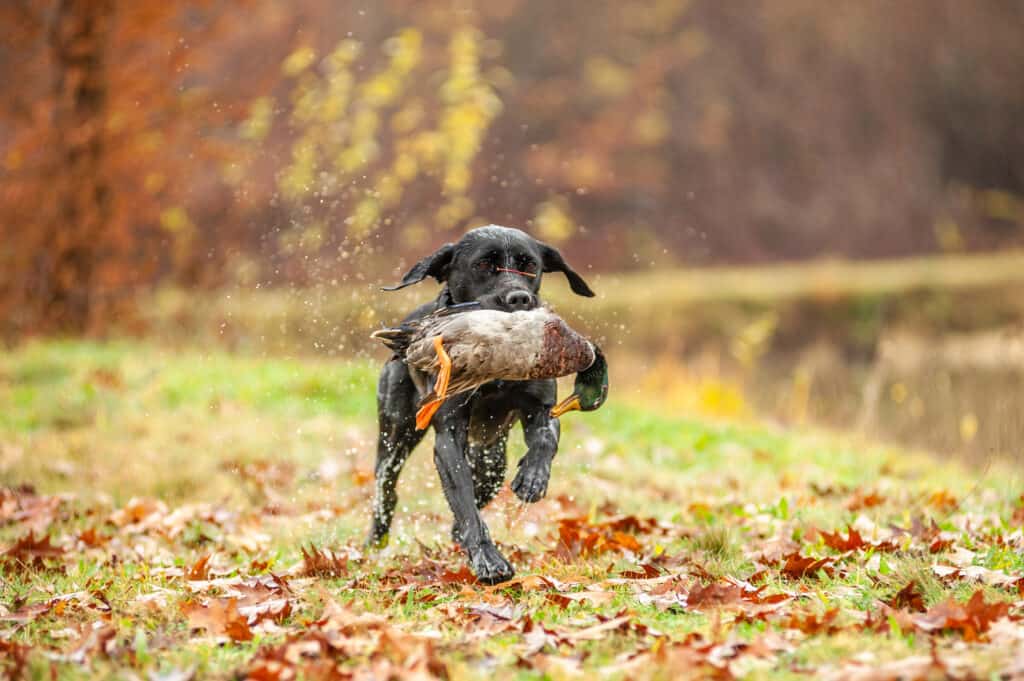
All hunters must carry their hunting licenses and adhere to all possession and bag limits.
©Anna Pozzi – Zoophotos/Shutterstock.com
Every state has a dedicated bag limit to ensure that animals are not being over-hunt. The bag limits will highly depend on Washington State’s limits and the type of Migratory Bird certificate you register for. There are two main types, the Duck license, and the Sea Duck License.
On average, each hunter is allowed a total of seven ducks daily. However, there are also species limits to what you can capture daily. Below is a list of the limits for specific species:
- Two hen mallard
- One pintail
- Two scaup
- Two canvasback
- Two redheads statewide
- Two scoter
- Two long-tailed duck
- 2 goldeneye (western Washington)
Possession limits are also important, as they outline how many ducks you can have on you legally at a time. For Washington State, you’ll have to pay close attention as the possession limits change depending on age and who’s hunting.
Generally, youth in west and east Washington can possess a total of seven ducks at a time. The same goes for youth, veterans, and active military—the possession limit changes statewide, as the possession limit is set to 21 at a time.
Here are the possession limit regulations for 21 ducks:
- Six hen mallard
- Three pintail
- Six scaup
- Six canvasback
- Six redheads statewide
- Six scoter
- Six long-tailed duck
- 6 goldeneye (western Washington)
Currently, Harlequin ducks are closed to harvest statewide. For 2023, that is the only limited one for waterfowl. Any other ducks can be caught.
Duck Hunting License Regulations in Washington State
The Washington State Legislature sets all licensing. In the state, the legislature has set that hunters of 16 years and under 18 must have a youth hunting license to participate. Any adult over 18 must get a license if they are planning to hunt. It includes the right type of license corresponding to a hunting license. For duck hunting, hunters will need to get a Migratory Bird Permit.
What Are the Shooting Hours?
Washington State is on the west coast and uses Pacific Standard Time (PST). Hunting hours change depending on the dates and location. In addition, hunting hours change with daylight savings time. Most days, hunters can begin their day at around 6:30 am and end it around 6:00 pm.
Of course, these hours can change depending on a handful of factors. It’s important to check hunting regulations within the state. You can be in the know about the current times by clicking here.
Best Duck Hunting Gear
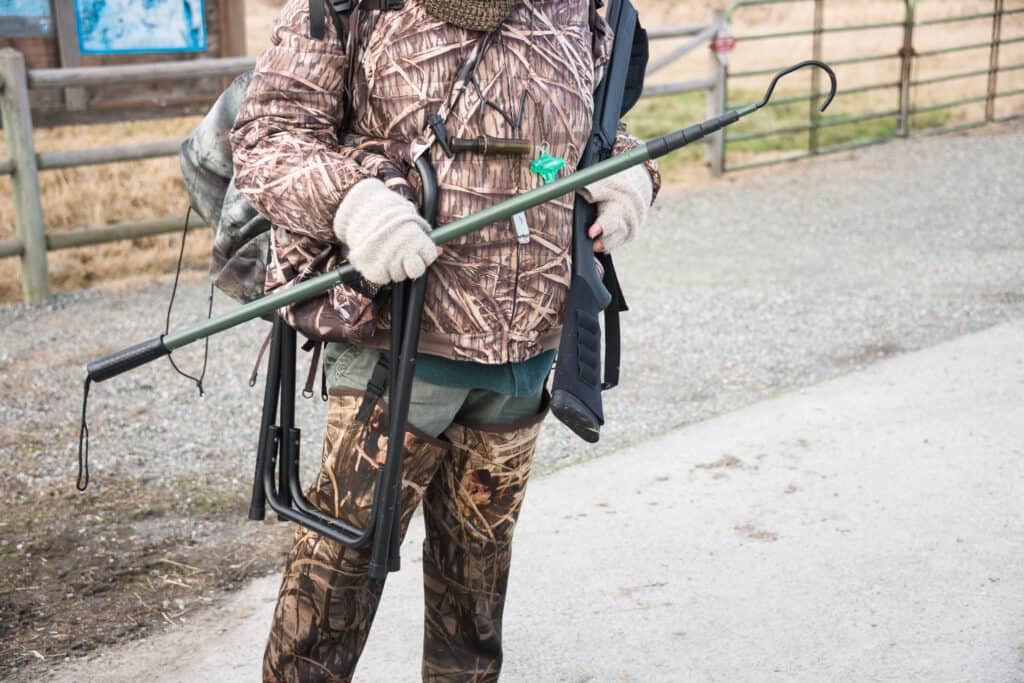
The best hunting gear will keep you protected and ensure that your hunt goes according to plan.
©Denise Lett/Shutterstock.com
Washington State is full of mountain ranges and many steep hills. Proper duck hunting requires basic gear to maximize your catches and not waste time. Experts will recommend that you have the following gear:
- Ammunition
- Blind bag
- Suck trap
- Gun case
- Hammer and stakes
- Binoculars
- Game shears
- Decoys
Washington state can get decently cold in the fall and winter, as low as 30 degrees Fahrenheit. Wearing the appropriate gear can help prevent you from having a bad time outdoors. In addition to that, you’ll also want to dress for the occasion with the following:
- Boots
- Camo set
- Gloves
- Earmuffs
- Socks
- Thermal underwear
- Facemask
While all this gear isn’t necessary, it is recommended by professionals. Hunting waterfowl is a bit different from other types of hunting, as you will need to sit and wait patiently. During this time, you’ll need to be comfortable. Getting gear, you can sit around with and be lightweight is key to enjoying your time outdoors in Washington State.
How to Be Successful During Duck Hunts
First-time duck hunters tend to imagine it’s as easy as just sitting and catching prey. However, ducks are very finicky, especially the many different types you can find in Washington State. Each duck species has its own traits, which can make them easy or difficult to catch. Here are some safety tips that can help make your hunting easier.
1. Complete Training and Safety Courses
The Washington Department of Fish and Wildlife does its best to help educate hunters before they get their licenses. Anyone born after January 1, 1972, must complete a hunter education class. Classes are offered year-round and are taught by volunteer instructors.
2. Adhere to Rules and Regulations
Any hunter must adhere to any hunting regulations created by The Washington Department of Fish and Wildlife. In addition, if hunting on private property, hunters must adhere to enforced rules. Non-adherence to rules and regulations is punishable by law.
Waterfowl hunters will need to adhere to bag restrictions along with possession limits. These limitations will change each season, and hunters are responsible for checking the updated rules annually. In addition to following rules, all hunters must carry their certification with them.
3. Use Good Gear
Washington State seems warm, but it can become chilly during hunting season. To combat this, wearing the correct gear can help create a pleasant hunting experience. For duck hunting, it’s essential to bring decoys and binoculars as these are the most important tools besides your weapon or traps.
4. Becoming Aware of Your Surroundings
Hunting in Washington State is tricky, as most of the area isn’t exactly flatlands. Understanding that there will be other hunters around is essential. Some might be using camo or other gear that could make them difficult to find. When using your gun, be extremely careful. That way, there are no accidents. If you’re not an experienced hunter, consider booking a guided hunt.
Best Places to Duck Hunt in Washington State
Each year for the past five, hunters in Washington State gathered more than 430,000 ducks in the season. Other regions don’t even come close to this number. So, here are the best duck hunting spots in Washington State:
- Grant County
- Yakima County
- Benton Couty
- Franklin
- Walla Walla
- Skagit County
- Whatcom
- Snohomish
- Frays Harbor
- Clark
Duck Hunting in Washington State FAQs
Can You Duck Hunt in Washington State?
Duck hunting is available in Washington State if you follow all rules and regulations. The Washington Department of Fish and Wildlife regulates who is and isn’t allowed to hunt by providing hunting licenses. All applicants must pass a safety test and meet all other requirements for the certificate. Once licensed, hunters must carry their license and adhere to all rules and limits.
When Does Duck Hunting Season Start in Washington State?
Duck hunting season in Washington State for 2023 begins on September 23rd for youth. Statewide, duck hunting begins on October 14th until January 28th. However, there are breaks in between that one needs to be aware of. This includes a break between October 22 and October 24th. Then, the Scaup season is closed from October 14th until November 3rd.
What Is the Limit for Duck Hunting in Washinton State?
The statewide limit is 21 ducks in possession. However, hunters also must adhere to the possession limit beyond the total count. The type of possession limit can change annually. So, it’s best to keep current on what is acceptable to hunt.
Where Is the Best Duck Hunting in Washington State?
The best duck hunting in Washington State is in Grant County. It’s eastern Washington’s top duck producer. In total, 70,000 birds are being hunted yearly. The second best place to hunt ducks in Washington State is Yakima County, followed by Benton County.
The photo featured at the top of this post is © Jim Nelson/Shutterstock.com
Thank you for reading! Have some feedback for us? Contact the AZ Animals editorial team.






